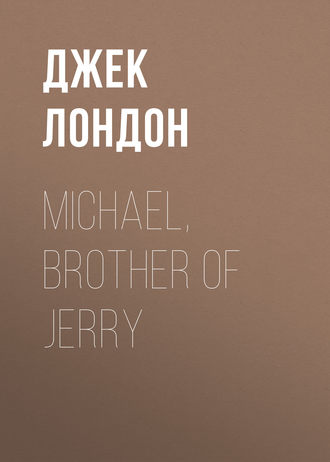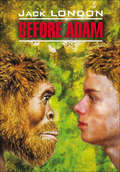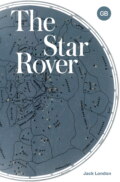
Джек Лондон
Michael, Brother of Jerry
CHAPTER III
In the meanwhile, Michael. Lifted through the air, exchanged into invisible hands that drew him through a narrow diameter of brass into a lighted room, Michael looked about him in expectancy of Jerry. But Jerry, at that moment, lay cuddled beside Villa Kennan’s sleeping-cot on the slant deck of the Ariel, as that trim craft, the Shortlands astern and New Guinea dead ahead, heeled her scuppers a-whisper and garrulous to the sea-welter alongside as she logged her eleven knots under the press of the freshening trades. Instead of Jerry, from whom he had last parted on board a boat, Michael saw Kwaque.
Kwaque? Well, Kwaque was Kwaque, an individual, more unlike all other men than most men are unlike one another. No queerer estray ever drifted along the stream of life. Seventeen years old he was, as men measure time; but a century was measured in his lean-lined face, his wrinkled forehead, his hollowed temples, and his deep-sunk eyes. From his thin legs, fragile-looking as windstraws, the bones of which were sheathed in withered skin with apparently no muscle padding in between – from such frail stems sprouted the torso of a fat man. The huge and protuberant stomach was amply supported by wide and massive hips, and the shoulders were broad as those of a Hercules. But, beheld sidewise, there was no depth to those shoulders and the top of the chest. Almost, at that part of his anatomy, he seemed builded in two dimensions. Thin his arms were as his legs, and, as Michael first beheld him, he had all the seeming of a big-bellied black spider.
He proceeded to dress, a matter of moments, slipping into duck trousers and blouse, dirty and frayed from long usage. Two fingers of his left hand were doubled into a permanent bend, and, to an expert, would have advertised that he was a leper. Although he belonged to Dag Daughtry just as much as if the steward possessed a chattel bill of sale of him, his owner did not know that his anæsthetic twist of ravaged nerves tokened the dread disease.
The manner of the ownership was simple. At King William Island, in the Admiralties, Kwaque had made, in the parlance of the South Pacific, a pier-head jump. So to speak, leprosy and all, he had jumped into Dag Daughtry’s arms. Strolling along the native runways in the fringe of jungle just beyond the beach, as was his custom, to see whatever he might pick up, the steward had picked up Kwaque. And he had picked him up in extremity.
Pursued by two very active young men armed with fire-hardened spears, tottering along with incredible swiftness on his two spindle legs, Kwaque had fallen exhausted at Daughtry’s feet and looked up at him with the beseeching eyes of a deer fleeing from the hounds. Daughtry had inquired into the matter, and the inquiry was violent; for he had a wholesome fear of germs and bacilli, and when the two active young men tried to run him through with their filth-corroded spears, he caught the spear of one young man under his arm and put the other young man to sleep with a left hook to the jaw. A moment later the young man whose spear he held had joined the other in slumber.
The elderly steward was not satisfied with the mere spears. While the rescued Kwaque continued to moan and slubber thankfulness at his feet, he proceeded to strip them that were naked. Nothing they wore in the way of clothing, but from around each of their necks he removed a necklace of porpoise teeth that was worth a gold sovereign in mere exchange value. From the kinky locks of one of the naked young men he drew a hand-carved, fine-toothed comb, the lofty back of which was inlaid with mother-of-pearl, which he later sold in Sydney to a curio shop for eight shillings. Nose and ear ornaments of bone and turtle-shell he also rifled, as well as a chest-crescent of pearl shell, fourteen inches across, worth fifteen shillings anywhere. The two spears ultimately fetched him five shillings each from the tourists at Port Moresby. Not lightly may a ship steward undertake to maintain a six-quart reputation.
When he turned to depart from the active young men, who, back to consciousness, were observing him with bright, quick, wild-animal eyes, Kwaque followed so close at his heels as to step upon them and make him stumble. Whereupon he loaded Kwaque with his trove and put him in front to lead along the runway to the beach. And for the rest of the way to the steamer, Dag Daughtry grinned and chuckled at sight of his plunder and at sight of Kwaque, who fantastically titubated and ambled along, barrel-like, on his pipe-stems.
On board the steamer, which happened to be the Cockspur, Daughtry persuaded the captain to enter Kwaque on the ship’s articles as steward’s helper with a rating of ten shillings a month. Also, he learned Kwaque’s story.
It was all an account of a pig. The two active young men were brothers who lived in the next village to his, and the pig had been theirs – so Kwaque narrated in atrocious bêche-de-mer English. He, Kwaque, had never seen the pig. He had never known of its existence until after it was dead. The two young men had loved the pig. But what of that? It did not concern Kwaque, who was as unaware of their love for the pig as he was unaware of the pig itself.
The first he knew, he averred, was the gossip of the village that the pig was dead, and that somebody would have to die for it. It was all right, he said, in reply to a query from the steward. It was the custom. Whenever a loved pig died its owners were in custom bound to go out and kill somebody, anybody. Of course, it was better if they killed the one whose magic had made the pig sick. But, failing that one, any one would do. Hence Kwaque was selected for the blood-atonement.
Dag Daughtry drank a seventh quart as he listened, so carried away was he by the sombre sense of romance of this dark jungle event wherein men killed even strangers because a pig was dead.
Scouts out on the runways, Kwaque continued, brought word of the coming of the two bereaved pig-owners, and the village had fled into the jungle and climbed trees – all except Kwaque, who was unable to climb trees.
“My word,” Kwaque concluded, “me no make ’m that fella pig sick.”
“My word,” quoth Dag Daughtry, “you devil-devil along that fella pig too much. You look ’m like hell. You make ’m any fella thing sick look along you. You make ’m me sick too much.”
It became quite a custom for the steward, as he finished his sixth bottle before turning in, to call upon Kwaque for his story. It carried him back to his boyhood when he had been excited by tales of wild cannibals in far lands and dreamed some day to see them for himself. And here he was, he would chuckle to himself, with a real true cannibal for a slave.
A slave Kwaque was, as much as if Daughtry had bought him on the auction-block. Whenever the steward transferred from ship to ship of the Burns Philp fleet, he always stipulated that Kwaque should accompany him and be duly rated at ten shillings. Kwaque had no say in the matter. Even had he desired to escape in Australian ports, there was no need for Daughtry to watch him. Australia, with her “all-white” policy, attended to that. No dark-skinned human, whether Malay, Japanese, or Polynesian, could land on her shore without putting into the Government’s hand a cash security of one hundred pounds.
Nor at the other islands visited by the Makambo had Kwaque any desire to cut and run for it. King William Island, which was the only land he had ever trod, was his yard-stick by which he measured all other islands. And since King William Island was cannibalistic, he could only conclude that the other islands were given to similar dietary practice.
As for King William Island, the Makambo, on the former run of the Cockspur, stopped there every ten weeks; but the direst threat Daughtry ever held over him was the putting ashore of him at the place where the two active young men still mourned their pig. In fact, it was their regular programme, each trip, to paddle out and around the Makambo and make ferocious grimaces up at Kwaque, who grimaced back at them from over the rail. Daughtry even encouraged this exchange of facial amenities for the purpose of deterring him from ever hoping to win ashore to the village of his birth.
For that matter, Kwaque had little desire to leave his master, who, after all, was kindly and just, and never lifted a hand to him. Having survived sea-sickness at the first, and never setting foot upon the land so that he never again knew sea-sickness, Kwaque was certain he lived in an earthly paradise. He never had to regret his inability to climb trees, because danger never threatened him. He had food regularly, and all he wanted, and it was such food! No one in his village could have dreamed of any delicacy of the many delicacies which he consumed all the time. Because of these matters he even pulled through a light attack of home-sickness, and was as contented a human as ever sailed the seas.
And Kwaque it was who pulled Michael through the port-hole into Dag Daughtry’s stateroom and waited for that worthy to arrive by the roundabout way of the door. After a quick look around the room and a sniff of the bunk and under the bunk which informed him that Jerry was not present, Michael turned his attention to Kwaque.
Kwaque tried to be friendly. He uttered a clucking noise in advertisement of his friendliness, and Michael snarled at this black who had dared to lay hands upon him – a contamination, according to Michael’s training – and who now dared to address him who associated only with white gods.
Kwaque passed off the rebuff with a silly gibbering laugh and started to step nearer the door to be in readiness to open it at his master’s coming. But at first lift of his leg, Michael flew at it. Kwaque immediately put it down, and Michael subsided, though he kept a watchful guard. What did he know of this strange black, save that he was a black and that, in the absence of a white master, all blacks required watching? Kwaque tried slowly sliding his foot along the floor, but Michael knew the trick and with bristle and growl put a stop to it.
It was upon this tableau that Daughtry entered, and, while he admired Michael much under the bright electric light, he realized the situation.
“Kwaque, you make ’m walk about leg belong you,” he commanded, in order to make sure.
Kwaque’s glance of apprehension at Michael was convincing enough, but the steward insisted. Kwaque gingerly obeyed, but scarcely had his foot moved an inch when Michael’s was upon him. The foot and leg petrified, while Michael stiff-leggedly drew a half-circle of intimidation about him.
“Got you nailed to the floor, eh?” Daughtry chuckled. “Some nigger-chaser, my word, any amount.”
“Hey, you, Kwaque, go fetch ’m two fella bottle of beer stop ’m along icey-chestis,” he commanded in his most peremptory manner.
Kwaque looked beseechingly, but did not stir. Nor did he stir at a harsher repetition of the order.
“My word!” the steward bullied. “Suppose ’m you no fetch ’m beer close up, I knock ’m eight bells ’n ’a dog-watch onta you. Suppose ’m you no fetch ’m close up, me make ’m you go ashore ’n’ walk about along King William Island.”
“No can,” Kwaque murmured timidly. “Eye belong dog look along me too much. Me no like ’m dog kai-kai along me.”
“You fright along dog?” his master demanded.
“My word, me fright along dog any amount.”
Dag Daughtry was delighted. Also, he was thirsty from his trip ashore and did not prolong the situation.
“Hey, you, dog,” he addressed Michael. “This fella boy he all right. Savvee? He all right.”
Michael bobbed his tail and flattened his ears in token that he was trying to understand. When the steward patted the black on the shoulder, Michael advanced and sniffed both the legs he had kept nailed to the floor.
“Walk about,” Daughtry commanded. “Walk about slow fella,” he cautioned, though there was little need.
Michael bristled, but permitted the first timid step. At the second he glanced up at Daughtry to make certain.
“That’s right,” he was reassured. “That fella boy belong me. He all right, you bet.”
Michael smiled with his eyes that he understood, and turned casually aside to investigate an open box on the floor which contained plates of turtle-shell, hack-saws, and emery paper.
* * * * *
“And now,” Dag Daughtry muttered weightily aloud, as, bottle in hand, he leaned back in his arm-chair while Kwaque knelt at his feet to unlace his shoes, “now to consider a name for you, Mister Dog, that will be just to your breeding and fair to my powers of invention.”
CHAPTER IV
Irish terriers, when they have gained maturity, are notable, not alone for their courage, fidelity, and capacity for love, but for their cool-headedness and power of self-control and restraint. They are less easily excited off their balance; they can recognize and obey their master’s voice in the scuffle and rage of battle; and they never fly into nervous hysterics such as are common, say, with fox-terriers.
Michael possessed no trace of hysteria, though he was more temperamentally excitable and explosive than his blood-brother Jerry, while his father and mother were a sedate old couple indeed compared with him. Far more than mature Jerry, was mature Michael playful and rowdyish. His ebullient spirits were always on tap to spill over on the slightest provocation, and, as he was afterwards to demonstrate, he could weary a puppy with play. In short, Michael was a merry soul.
“Soul” is used advisedly. Whatever the human soul may be – informing spirit, identity, personality, consciousness – that intangible thing Michael certainly possessed. His soul, differing only in degree, partook of the same attributes as the human soul. He knew love, sorrow, joy, wrath, pride, self-consciousness, humour. Three cardinal attributes of the human soul are memory, will, and understanding; and memory, will, and understanding were Michael’s.
Just like a human, with his five senses he contacted with the world exterior to him. Just like a human, the results to him of these contacts were sensations. Just like a human, these sensations on occasion culminated in emotions. Still further, like a human, he could and did perceive, and such perceptions did flower in his brain as concepts, certainly not so wide and deep and recondite as those of humans, but concepts nevertheless.
Perhaps, to let the human down a trifle from such disgraceful identity of the highest life-attributes, it would be well to admit that Michael’s sensations were not quite so poignant, say in the matter of a needle-thrust through his foot as compared with a needle-thrust through the palm of a hand. Also, it is admitted, when consciousness suffused his brain with a thought, that the thought was dimmer, vaguer than a similar thought in a human brain. Furthermore, it is admitted that never, never, in a million lifetimes, could Michael have demonstrated a proposition in Euclid or solved a quadratic equation. Yet he was capable of knowing beyond all peradventure of a doubt that three bones are more than two bones, and that ten dogs compose a more redoubtable host than do two dogs.
One admission, however, will not be made, namely, that Michael could not love as devotedly, as wholeheartedly, unselfishly, madly, self-sacrificingly as a human. He did so love – not because he was Michael, but because he was a dog.
Michael had loved Captain Kellar more than he loved his own life. No more than Jerry for Skipper, would he have hesitated to risk his life for Captain Kellar. And he was destined, as time went by and the conviction that Captain Kellar had passed into the inevitable nothingness along with Meringe and the Solomons, to love just as absolutely this six-quart steward with the understanding ways and the fascinating lip-caress. Kwaque, no; for Kwaque was black. Kwaque he merely accepted, as an appurtenance, as a part of the human landscape, as a chattel of Dag Daughtry.
But he did not know this new god as Dag Daughtry. Kwaque called him “marster”; but Michael heard other white men so addressed by the blacks. Many blacks had he heard call Captain Kellar “marster.” It was Captain Duncan who called the steward “Steward.” Michael came to hear him, and his officers, and all the passengers, so call him; and thus, to Michael, his god’s name was Steward, and for ever after he was to know him and think of him as Steward.
There was the question of his own name. The next evening after he came on board, Dag Daughtry talked it over with him. Michael sat on his haunches, the length of his lower jaw resting on Daughtry’s knee, the while his eyes dilated, contracted and glowed, his ears ever pricking and repricking to listen, his stump tail thumping ecstatically on the floor.
“It’s this way, son,” the steward told him. “Your father and mother were Irish. Now don’t be denying it, you rascal – ”
This, as Michael, encouraged by the unmistakable geniality and kindness in the voice, wriggled his whole body and thumped double knocks of delight with his tail. Not that he understood a word of it, but that he did understand the something behind the speech that informed the string of sounds with all the mysterious likeableness that white gods possessed.
“Never be ashamed of your ancestry. An’ remember, God loves the Irish – Kwaque! Go fetch ’m two bottle beer fella stop ’m along icey-chestis! – Why, the very mug of you, my lad, sticks out Irish all over it.” (Michael’s tail beat a tattoo.) “Now don’t be blarneyin’ me. ’Tis well I’m wise to your insidyous, snugglin’, heart-stealin’ ways. I’ll have ye know my heart’s impervious. ’Tis soaked too long this many a day in beer. I stole you to sell you, not to be lovin’ you. I could’ve loved you once; but that was before me and beer was introduced. I’d sell you for twenty quid right now, coin down, if the chance offered. An’ I ain’t goin’ to love you, so you can put that in your pipe ’n’ smoke it.”
“But as I was about to say when so rudely interrupted by your ’fectionate ways – ”
Here he broke off to tilt to his mouth the opened bottle Kwaque handed him. He sighed, wiped his lips with the back of his hand, and proceeded.
“’Tis a strange thing, son, this silly matter of beer. Kwaque, the Methusalem-faced ape grinnin’ there, belongs to me. But by my faith do I belong to beer, bottles ’n’ bottles of it ’n’ mountains of bottles of it enough to sink the ship. Dog, truly I envy you, settin’ there comfortable-like inside your body that’s untainted of alcohol. I may own you, and the man that gives me twenty quid will own you, but never will a mountain of bottles own you. You’re a freer man than I am, Mister Dog, though I don’t know your name. Which reminds me – ”
He drained the bottle, tossed it to Kwaque, and made signs for him to open the remaining one.
“The namin’ of you, son, is not lightly to be considered. Irish, of course, but what shall it be? Paddy? Well may you shake your head. There’s no smack of distinction to it. Who’d mistake you for a hod-carrier? Ballymena might do, but it sounds much like a lady, my boy. Ay, boy you are. ’Tis an idea. Boy! Let’s see. Banshee Boy? Rotten. Lad of Erin!”
He nodded approbation and reached for the second bottle. He drank and meditated, and drank again.
“I’ve got you,” he announced solemnly. “Killeny is a lovely name, and it’s Killeny Boy for you. How’s that strike your honourableness? – high-soundin’, dignified as a earl or.. or a retired brewer. Many’s the one of that gentry I’ve helped to retire in my day.”
He finished his bottle, caught Michael suddenly by both jowls, and, leaning forward, rubbed noses with him. As suddenly released, with thumping tail and dancing eyes, Michael gazed up into the god’s face. A definite soul, or entity, or spirit-thing glimmered behind his dog’s eyes, already fond with affection for this hair-grizzled god who talked with him he knew not what, but whose very talking carried delicious and unguessable messages to his heart.
“Hey! Kwaque, you!”
Kwaque, squatted on the floor, his hams on his heels, paused from the rough-polishing of a shell comb designed and cut out by his master, and looked up, eager to receive command and serve.
“Kwaque, you fella this time now savvee name stop along this fella dog. His name belong ’m him, Killeny Boy. You make ’m name stop ’m inside head belong you. All the time you speak ’m this fella dog, you speak ’m Killeny Boy. Savvee? Suppose ’m you no savvee, I knock ’m block off belong you. Killeny Boy, savvee! Killeny Boy. Killeny Boy.”
As Kwaque removed his shoes and helped him undress, Daughtry regarded Michael with sleepy eyes.
“I’ve got you, laddy,” he announced, as he stood up and swayed toward bed. “I’ve got your name, an’ here’s your number – I got that, too: high-strung but reasonable. It fits you like the paper on the wall.
“High-strung but reasonable, that’s what you are, Killeny Boy, high-strung but reasonable,” he continued to mumble as Kwaque helped to roll him into his bunk.
Kwaque returned to his polishing. His lips stammered and halted in the making of noiseless whispers, as, with corrugated brows of puzzlement, he addressed the steward:
“Marster, what name stop ’m along that fella dog?”
“Killeny Boy, you kinky-head man-eater, Killeny Boy, Killeny Boy,” Dag Daughtry murmured drowsily. “Kwaque, you black blood-drinker, run n’ fetch ’m one fella bottle stop ’m along icey-chestis.”
“No stop ’m, marster,” the black quavered, with eyes alert for something to be thrown at him. “Six fella bottle he finish altogether.”
The steward’s sole reply was a snore.
The black, with the twisted hand of leprosy and with a barely perceptible infiltration of the same disease thickening the skin of the forehead between the eyes, bent over his polishing, and ever his lips moved, repeating over and over, “Killeny Boy.”






